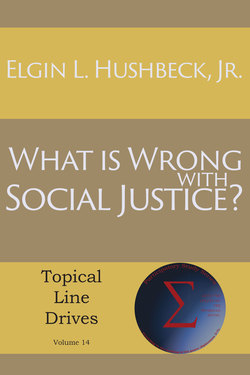Читать книгу What Is Wrong with Social Justice - Jr. Elgin L Hushbeck - Страница 3
На сайте Литреса книга снята с продажи.
ОглавлениеIntroduction
Social Justices both infuses and shapes our society. Individuals, community organizers, and union leaders advocate it. Spiritual leaders such as pastors, priests, and even the pope teach it. Thus, it should be no surprise to find city, state, and national politicians, along with governments and world organizations such as the UN, also playing a strong role in this seemingly ubiquitous movement. Who could be against it?
I am, and this short work will briefly lay out some of the problems with Social Justice. It will start by looking at the concept itself, what do people mean by ‘Social Justice.’ Since many of its supporters see religious obligations for Social Justice, the second part will look at its biblical basis. We will then examine how destructive the theories of Social Justice are when put into practice. In doing this, we will see that Social Justice is questionable in theory, wrong scripturally, and harmful in practice.
When presented with such evidence, supporters of Social Justice knowingly or unknowingly often resort to the irrational fallacy of an ad hominem attack; that is, they label detractors as uncaring, or in some cases greedy, selfish, or even racist. To counter this error, the last part will sketch an alternative approach that I believe is more rational, biblical, and, in fact, already has produced far better results.
Given the constraints of the Topical Line Drives series, i.e., short, focused discussions on a question or topic, one should not expect a full and complete analysis. Many books have been written on the definition of Social Justice alone. A quick search for books on Social Justice at Amazon.com returned over 100,000 results. Here I can only outline the basic arguments.
Also, while Social Justice is not limited to economics, that will be the main focus of this discussion. So there will be nuances and qualifications that, given the limitation of space, I will not be able to address. Likewise, there will be objections to my claims that I am well aware of, but again did not have the space to address, which will be particularly true in Part IV. Thus I will close with a further reading section for those who want to explore these arguments in more detail. What I do hope is that this short book raises some questions about Social Justice and points the way towards a better approach.
